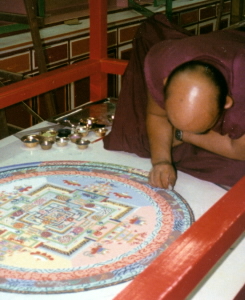Difference between revisions of "Mind Training or lojong"
| Line 4: | Line 4: | ||
| − | + | ||
[[Seven Points of Training the Mind]]: | [[Seven Points of Training the Mind]]: | ||
| Line 13: | Line 13: | ||
| − | ONE: | + | ==ONE: The [[preliminaries, which are the basis for dharma practice]]== |
| − | + | :: First, train in the preliminaries. | |
| − | TWO: | + | ==TWO: The main practice, which is [[training in bodhicitta]]== |
| − | |||
| + | <poem> | ||
[[Absolute]] [[Bodhicitta]] | [[Absolute]] [[Bodhicitta]] | ||
Regard all [[dharmas]] as [[dreams]]. | Regard all [[dharmas]] as [[dreams]]. | ||
| Line 38: | Line 38: | ||
In all [[activities]], train with slogans. | In all [[activities]], train with slogans. | ||
Begin the sequence of sending and taking with yourself. | Begin the sequence of sending and taking with yourself. | ||
| + | </poem> | ||
| − | + | ==THREE: [[Transformation of Bad Circumstances into the Way of Enlightenment]]== | |
| − | THREE: | ||
| − | |||
| + | <poem> | ||
When the [[world]] is filled with [[evil]], [[transform]] all mishaps into the [[path]] of [[bodhi]]. | When the [[world]] is filled with [[evil]], [[transform]] all mishaps into the [[path]] of [[bodhi]]. | ||
Drive all blames into one. | Drive all blames into one. | ||
| Line 52: | Line 52: | ||
Four practices are the best of methods. | Four practices are the best of methods. | ||
Whatever you meet unexpectedly, join with [[meditation]]. | Whatever you meet unexpectedly, join with [[meditation]]. | ||
| + | </poem> | ||
| − | + | ==FOUR: [[Showing the Utilization of Practice in One's Whole Life]]== | |
| − | FOUR: | ||
| − | |||
| + | <poem> | ||
Practice the [[five strengths]], the condensed [[heart]] instructions. | Practice the [[five strengths]], the condensed [[heart]] instructions. | ||
The [[mahayana]] instruction for [[ejection of consciousness]] at [[death]] is the [[five strengths]]: how you conduct yourself is important. | The [[mahayana]] instruction for [[ejection of consciousness]] at [[death]] is the [[five strengths]]: how you conduct yourself is important. | ||
| + | </poem> | ||
| + | ==FIVE: [[Evaluation of Mind Training]]== | ||
| − | + | <poem> | |
| − | |||
| − | |||
All [[dharma]] agrees at one point. | All [[dharma]] agrees at one point. | ||
Of the two witnesses, hold the [[principal]] one. | Of the two witnesses, hold the [[principal]] one. | ||
Always maintain only a [[joyful]] [[mind]]. | Always maintain only a [[joyful]] [[mind]]. | ||
If you can practice even when distracted, you are well trained. | If you can practice even when distracted, you are well trained. | ||
| + | </poem> | ||
| − | + | ==SIX: [[Disciplines of Mind Training]]== | |
| − | SIX: | ||
| − | |||
| + | <poem> | ||
Always abide by the three basic {{Wiki|principles}}. | Always abide by the three basic {{Wiki|principles}}. | ||
Change you [[attitude]], but remain natural. | Change you [[attitude]], but remain natural. | ||
| Line 94: | Line 94: | ||
Don't make [[gods]] into {{Wiki|demons}}. | Don't make [[gods]] into {{Wiki|demons}}. | ||
Don't seek others' [[pain]] as the limbs of your [[own]] [[happiness]]. | Don't seek others' [[pain]] as the limbs of your [[own]] [[happiness]]. | ||
| + | </poem> | ||
| − | + | ==SEVEN: [[Guidelines of Mind Training]]== | |
| − | SEVEN: Guidelines of | + | <poem> |
| − | |||
All [[activities]] should be done with one [[intention]]. | All [[activities]] should be done with one [[intention]]. | ||
Correct all wrongs with one [[intention]]. | Correct all wrongs with one [[intention]]. | ||
| Line 120: | Line 120: | ||
Don't be frivolous. | Don't be frivolous. | ||
Don't expect applause. | Don't expect applause. | ||
| − | + | </poem> | |
| − | + | <poem> | |
When the five dark ages occur, | When the five dark ages occur, | ||
This is the way to [[transform]] them into the [[path]] of [[bodhi]]. | This is the way to [[transform]] them into the [[path]] of [[bodhi]]. | ||
Latest revision as of 05:21, 25 December 2015
Seven Points of Training the Mind:
The Root Text
Translated by the Nalanda Translation Committee under the direction of Chögyam Trungpa, Rinpoche.
Contents
- 1 ONE: The preliminaries, which are the basis for dharma practice
- 2 TWO: The main practice, which is training in bodhicitta
- 3 THREE: Transformation of Bad Circumstances into the Way of Enlightenment
- 4 FOUR: Showing the Utilization of Practice in One's Whole Life
- 5 FIVE: Evaluation of Mind Training
- 6 SIX: Disciplines of Mind Training
- 7 SEVEN: Guidelines of Mind Training
ONE: The preliminaries, which are the basis for dharma practice
- First, train in the preliminaries.
TWO: The main practice, which is training in bodhicitta
Absolute Bodhicitta
Regard all dharmas as dreams.
Examine the nature of unborn awareness.
Self-liberate even the antidote.
Rest in the nature of alaya, the essence.
In postmeditation, be a child of illusion.
Relative Bodhicitta
Sending and taking should be practiced alternately. These two should ride
the breath.
Three objects, three poisons, three roots of virtue.
In all activities, train with slogans.
Begin the sequence of sending and taking with yourself.
THREE: Transformation of Bad Circumstances into the Way of Enlightenment
When the world is filled with evil, transform all mishaps into the path of bodhi.
Drive all blames into one.
Be grateful to everyone.
Seeing confusion as the four kayas is unsurpassable shunyata protection.
Four practices are the best of methods.
Whatever you meet unexpectedly, join with meditation.
FOUR: Showing the Utilization of Practice in One's Whole Life
Practice the five strengths, the condensed heart instructions.
The mahayana instruction for ejection of consciousness at death is the five strengths: how you conduct yourself is important.
FIVE: Evaluation of Mind Training
All dharma agrees at one point.
Of the two witnesses, hold the principal one.
Always maintain only a joyful mind.
If you can practice even when distracted, you are well trained.
SIX: Disciplines of Mind Training
Always abide by the three basic principles.
Change you attitude, but remain natural.
Don't talk about injured limbs.
Don't ponder others.
Work with the greatest defilements first.
Abandon any hope of fruition.
Abandon poisonous food.
Don't be so predictable.
Don't malign others.
Don't wait in ambush.
Don't bring things to a painful point.
Don't transfer the ox's load to the cow.
Don't try to be the fastest.
Don't act with a twist.
Don't make gods into demons.
Don't seek others' pain as the limbs of your own happiness.
SEVEN: Guidelines of Mind Training
All activities should be done with one intention.
Correct all wrongs with one intention.
Two activities: one at the beginning, one at the end.
Whichever of the two occurs, be patient.
Observe these two, even at the risk of your life.
Train in the three difficulties.
Take on the three principal causes.
Pay heed that the three never wane.
Keep the three inseparable.
Train without bias in all areas. It is crucial always to do this pervasively
and wholeheartedly.
Always meditate on whatever provokes resentment.
Don't be swayed by external circumstances.
This time, practice the main points.
Don't misinterpret.
Don't vacillate.
Train wholeheartedly.
Liberate yourself by examining and analyzing.
Don't wallow in self-pity.
Don't be jealous.
Don't be frivolous.
Don't expect applause.
When the five dark ages occur,
This is the way to transform them into the path of bodhi.
This is the essence of the amrita of the oral instructions,
Which were handed down from the tradition of the sage Suvarnadvipa.
Having awoken the karma of previous training
And being urged on by my intense dedication,
I disregarded misfortune and slander
And received oral instruction on taming ego-fixation.
Now, even at death, I will have no regrets.




